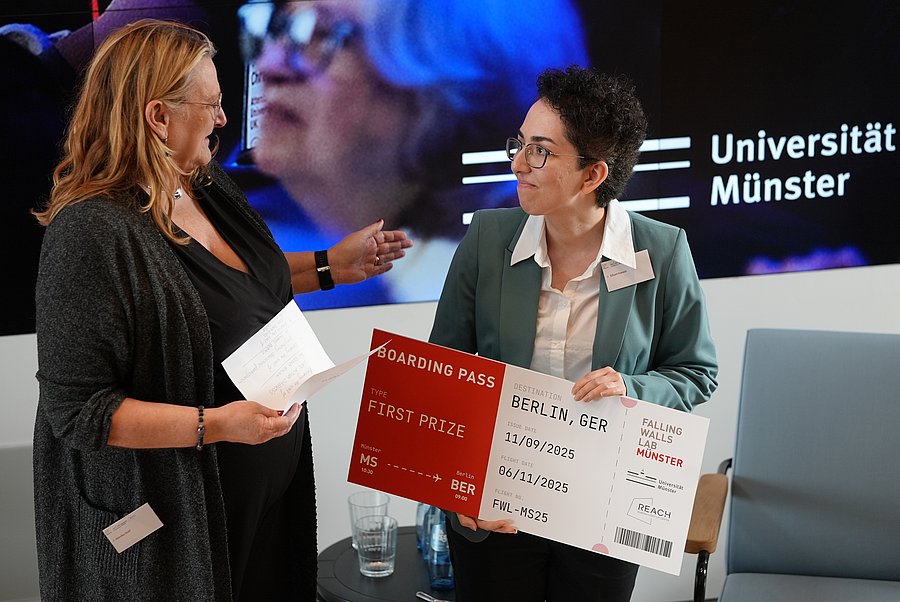Serving society
Idea presented: Wuppertal doctoral student at the Summit for Research and Innovation in Berlin

Elham Iravani won her ticket for Berlin at the preliminary round in Münster // Photo REACH - Timo Adiek
How can technology serve people and improve their lives? This question drives Elham Iravani, a doctoral student at the University of Wuppertal. Years ago, while working on a project on improving joint attention in children with autism spectrum disorder, she had an idea. "I always dreamed of one day being able to turn it into reality and create something that would help children with autism. I just had to find the right moment to take the first step,” she explains. That moment came when she read the call for applications for the University of Münster's ’Falling Walls Lab‘. “I immediately felt that this was the right place to finally share my idea with others."
The presentation of the concept in Münster was an unforgettable experience. “The atmosphere was inspiring and very encouraging. It was an incredible feeling to see how the audience and the jury reacted to my idea. That moment really motivated me and gave me the confidence to continue and realize my vision,” she recalls of the first public presentation of her idea in mid-September.
The Falling Walls Lab Münster was one of only three nationwide preliminary rounds for the prestigious Falling Walls Science Summit. The global summit takes place annually around the anniversary of the fall of the Berlin Wall. Under the theme “Which walls will fall next in science and society?”, it brings together guests and leading figures from science, politics, civil society, business and the media. At the beginning of November, Elham Iravani had the opportunity to compete with around 100 other participants from 66 countries.
‘It was a great opportunity to reach an even wider audience, share my idea and receive valuable feedback from a diverse community of scientists from different fields,’ she reported afterwards.
From an idea to a labour of love
During her project at the time, she got to know children with autism. Observing them during diagnosis and therapy sessions was a special experience that left a lasting impression on her. “I realized how important early intervention is,” says Elham Iravani. She remembers a ten-year-old girl who couldn't speak because therapy hadn't started early enough. “When intervention starts in the first years of life, significant progress is often possible. Even if there is no cure for Autism yet, early and effective support can significantly improve the quality of life for people with autism,” says Iravani.
She reflects: “What if we could use something simple and familiar, such as a child's toy, to observe how children interact with the toy and thus detect early signs of autism spectrum disorder that are difficult for parents and doctors to recognize in the early years?” Such a tool could be available in every household, even where families do not have the necessary knowledge for early detection or the resources. The result was an idea that has been close to her heart ever since and reflects her passion for combining technology and medicine to make a positive impact on society.
From idea to prototype
The development of the toy is not part of her doctoral thesis, but a separate idea that she is pursuing out of her personal interest. “However, my extensive experience in research and technology is being incorporated into its development,” explains the scientist, who worked in the field of robotics at Bielefeld University, among other places, before beginning her doctorate at the University of Wuppertal.
When asked how she herself assesses the prospects of the toy one day being used in the diagnostics of autism, Iravani says: “It's too early to say, but my goal is clearly to investigate how playful interaction can provide useful insights for the early detection and support of children with autism.”
---
*Editor's note: The original article from 29 October was updated on 7 November following the Falling Walls Science Summit.
More background on Elham Iravani's research interests
Elham Iravani is pursuing her doctorate at the Institute for Technologies and Management of Digital Transformation (TMDT) at the University of Wuppertal under the supervision of Prof. Dr.-Ing. Tobias Meisen and the technology company APTIV, which specializes in the development of mobility solutions. Her doctoral research focuses on computer-assisted enhancement of reality perception through technology (advanced perception), 3D scene understanding, and machine learning to improve in-vehicle monitoring and enhance automotive safety. “The combination of strong academic research and practical collaboration with industry was exactly what I was looking for,” says Elham Iravani, describing her choice of Wuppertal.
She sees her professional future in a field where she can continue to combine research, creativity and technology – in the service of society.
More background on Falling Walls Labs
Falling Walls Labs are international, multidisciplinary pitch competitions for students, doctoral candidates and early postdocs. They offer young scientists and innovators a platform to present their projects and visions and to network locally and globally. In just three minutes, participants present their ideas and convince the jury and audience.
Every year, more than 80 renowned universities and research institutions around the world organize their own Falling Walls Lab to showcase the most innovative minds in their region. The winners of the regional Labs qualify for the global final at the Falling Walls Science Summit in Berlin, where they have the chance to win the title ‘Breakthrough of the Year’.
